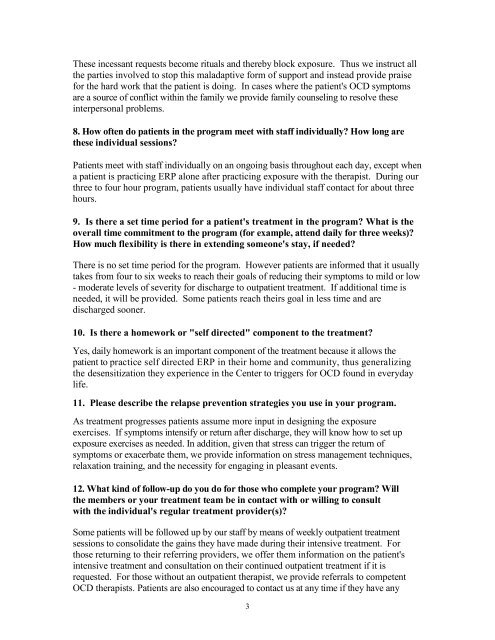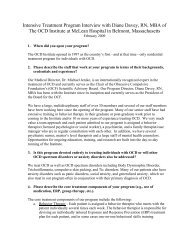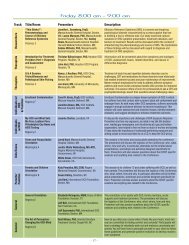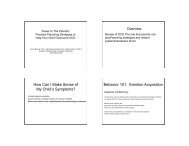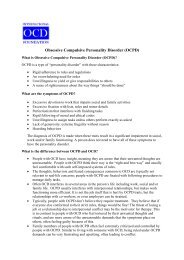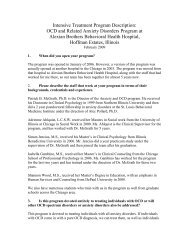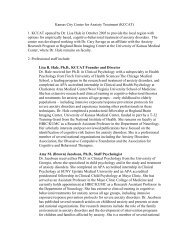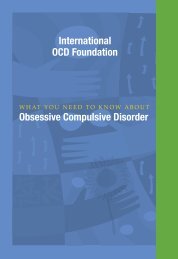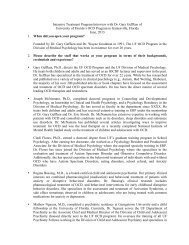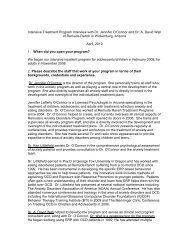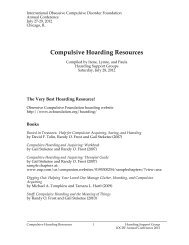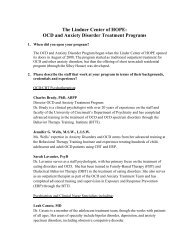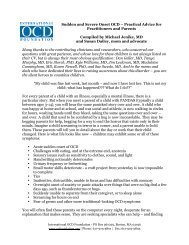Interview with Dr. Paul Munford of The Cognitive Behavior Therapy ...
Interview with Dr. Paul Munford of The Cognitive Behavior Therapy ...
Interview with Dr. Paul Munford of The Cognitive Behavior Therapy ...
- No tags were found...
You also want an ePaper? Increase the reach of your titles
YUMPU automatically turns print PDFs into web optimized ePapers that Google loves.
<strong>The</strong>se incessant requests become rituals and thereby block exposure. Thus we instruct all<br />
the parties involved to stop this maladaptive form <strong>of</strong> support and instead provide praise<br />
for the hard work that the patient is doing. In cases where the patient's OCD symptoms<br />
are a source <strong>of</strong> conflict <strong>with</strong>in the family we provide family counseling to resolve these<br />
interpersonal problems.<br />
8. How <strong>of</strong>ten do patients in the program meet <strong>with</strong> staff individually How long are<br />
these individual sessions<br />
Patients meet <strong>with</strong> staff individually on an ongoing basis throughout each day, except when<br />
a patient is practicing ERP alone after practicing exposure <strong>with</strong> the therapist. During our<br />
three to four hour program, patients usually have individual staff contact for about three<br />
hours.<br />
9. Is there a set time period for a patient's treatment in the program What is the<br />
overall time commitment to the program (for example, attend daily for three weeks)<br />
How much flexibility is there in extending someone's stay, if needed<br />
<strong>The</strong>re is no set time period for the program. However patients are informed that it usually<br />
takes from four to six weeks to reach their goals <strong>of</strong> reducing their symptoms to mild or low<br />
- moderate levels <strong>of</strong> severity for discharge to outpatient treatment. If additional time is<br />
needed, it will be provided. Some patients reach theirs goal in less time and are<br />
discharged sooner.<br />
10. Is there a homework or "self directed" component to the treatment<br />
Yes, daily homework is an important component <strong>of</strong> the treatment because it allows the<br />
patient to practice self directed ERP in their home and community, thus generalizing<br />
the desensitization they experience in the Center to triggers for OCD found in everyday<br />
life.<br />
11. Please describe the relapse prevention strategies you use in your program.<br />
As treatment progresses patients assume more input in designing the exposure<br />
exercises. If symptoms intensify or return after discharge, they will know how to set up<br />
exposure exercises as needed. In addition, given that stress can trigger the return <strong>of</strong><br />
symptoms or exacerbate them, we provide information on stress management techniques,<br />
relaxation training, and the necessity for engaging in pleasant events.<br />
12. What kind <strong>of</strong> follow-up do you do for those who complete your program Will<br />
the members or your treatment team be in contact <strong>with</strong> or willing to consult<br />
<strong>with</strong> the individual's regular treatment provider(s)<br />
Some patients will be followed up by our staff by means <strong>of</strong> weekly outpatient treatment<br />
sessions to consolidate the gains they have made during their intensive treatment. For<br />
those returning to their referring providers, we <strong>of</strong>fer them information on the patient's<br />
intensive treatment and consultation on their continued outpatient treatment if it is<br />
requested. For those <strong>with</strong>out an outpatient therapist, we provide referrals to competent<br />
OCD therapists. Patients are also encouraged to contact us at any time if they have any<br />
3


